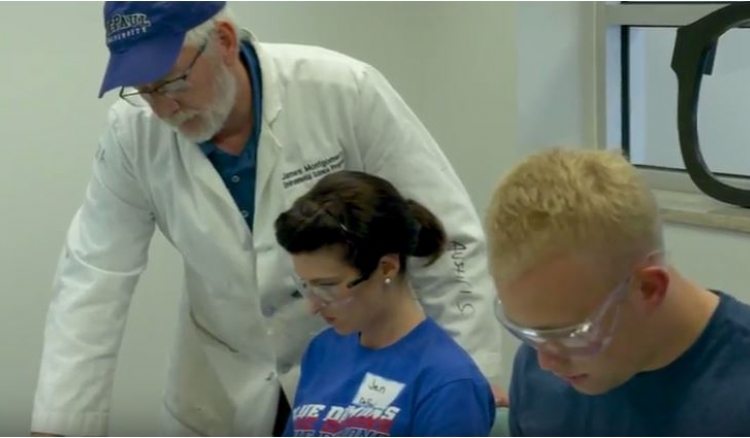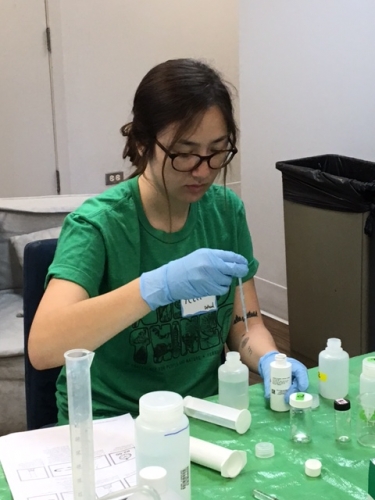 Together with students and colleagues, James Montgomery's (left) lead health fair successfully tested residential soil and water, educated the residents on lead exposure and allowed for the collection of data to map patterns and trends. (Image courtesy of Office of Mission and Values, produced by Soleil Media 2017)
Together with students and colleagues, James Montgomery's (left) lead health fair successfully tested residential soil and water, educated the residents on lead exposure and allowed for the collection of data to map patterns and trends. (Image courtesy of Office of Mission and Values, produced by Soleil Media 2017)
What could a soil researcher possibly have in common with St. Vincent?
At DePaul University, the answer is clear.
They both benefitted from financial grants in order to do good for those who are most at risk.
The Vincentian Endowment Fund, administered through the Office of Mission and Values, supports projects that directly enhance DePaul's Catholic, Vincentian, and urban identity, and connect the university to the community through service. The Vincentian Endowment Fund provides grants to grow academic programs, launch initiatives, conduct research and perform service work.
A brief history
Now celebrating its 25th year, the Vincentian priests and brothers at the university established the Vincentian Endowment Fund was established in 1992. They decided that the program would be the best way to encourage and reward projects that expand on the vision of St. Vincent de Paul.
Founded with $700,000, the fund quickly grew with an added infusion of $200,000, to make it a fund that totaled more than $900,000.
"When the Vincentians were considering a gift, we looked to how we could encourage a growing appreciation for DePaul to be a Catholic, Vincentian, and urban institution as called for by our mission," says Rev. Edward Udovic, C.M., secretary of the university and senior executive for university mission. "The best way to encourage and reward that was through grass-root efforts."
 A student in the Vincentian Endowment funded lead health fair tested residential soil and water. (Image courtesy of James Montgomery)
A student in the Vincentian Endowment funded lead health fair tested residential soil and water. (Image courtesy of James Montgomery)
Funding mission projects
James Montgomery, an associate professor and interim chair of the department of health science, has long been analyzing soil for the presence of lead through his "What's in your Soil" research initiative. He received a Vincentian Endowment Fund grant to conduct a community lead health fair in an underserved, low-income community in Chicago.
Montgomery partnered with Julia Lippert, a clinical assistant professor in the Master of Public Health Program, and in May 2017 they held the first Community Lead Health Fair. Together with students and colleagues, Montgomery's lead health fair successfully tested residential soil and water, educated the residents on lead exposure and allowed for the collection of data to map patterns and trends.
"There is no safe level of lead exposure. It is still a problem for school-aged children," he says. "Once children have blood lead poisoning, they can be in for a lifetime of health issues."
The Vincentian Endowment grant provided Montgomery the seed money to launch the first community lead health fair. He has since collaborated with Metropolitan YMCA to host six more fairs and make his project a sustainable initiative.
"Vincentian Venture Capital"
Since the Vincentian Endowment Fund grant program began, almost 700 grants have been awarded, totaling more than $2.1 million.
The annual time to apply for the Vincentian Endowment Fund grants is open now through Oct. 15, 2017. Projects or initiatives must meet the eligible criteria to be awarded grants.
"There is no shortage of grant ideas, but they may be ideas at risk within a tight budget or in a department that may not have the resources to accomplish the project," says Scott Kelley, assistant vice president for Vincentian Scholarship. "The Vincentian Endowment Fund is a way for people to pursue those opportunities and a way to advance the mission in creative and exciting ways that advance the mission."
Kelley added that the Vincentian Endowment Fund is designed to serve as "venture capital" for mission-centric projects and initiatives.
"Vincentian Endowment Fund grants can start funding something that may ultimately become a standard program," he says.
How to Apply for a VEF Grant
The Vincentian Endowment Fund supports grant projects that directly enhance the identity of DePaul as a Catholic, Vincentian and urban university,
Grant applications will be accepted until 11:59 p.m. on Oct. 15.
To learn more about the VEF grant and the selection criteria, please visit the grant's website.
The Endowment Board will meet during the week of Oct. 23, with grant decisions announced during the week of Oct. 30, 2017.